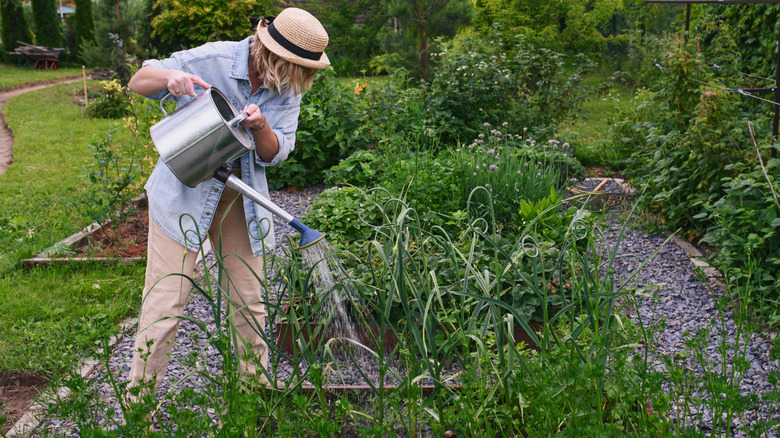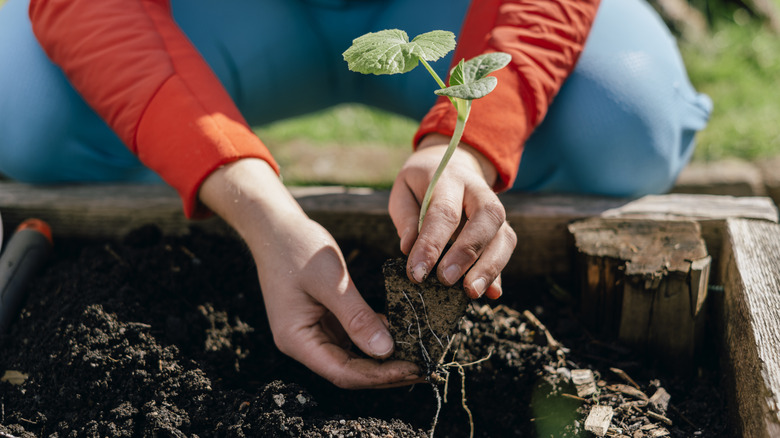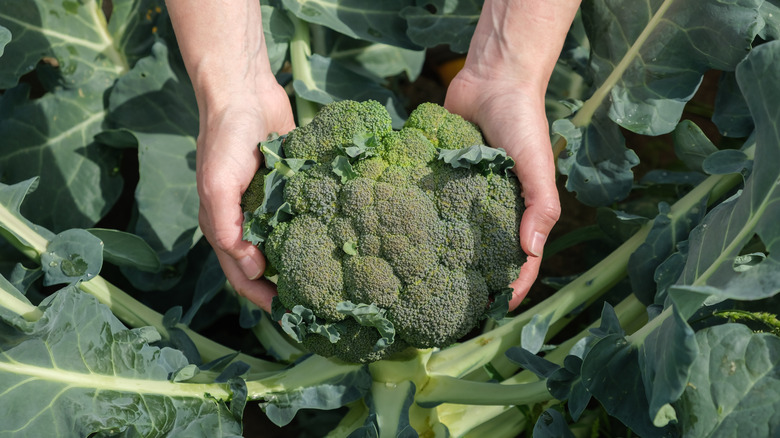Here's How Often You Should Be Watering Your Garden For Healthy Vegetables
You should always be following the best tips for growing a healthy garden, and proper irrigation technique is one of the most important — especially when you're working with vegetables. An average veggie at harvest consists of 80% to 90% water, meaning they need plenty of moisture if you want large and healthy crops. So how do you determine how much to water them? And do certain types require more or less moisture at different times during their growth?
As a general rule, established vegetable plants require about 1 inch of water per week, whether you're irrigating or receiving rain. To ensure accuracy, you should use a rain gauge or an empty food can to measure how much water your crop is receiving. To deliver that 1 inch of moisture to an established garden, try to provide about ⅓ inch three times per week in the morning or evening. These are the best times of day to water your vegetables — before direct sunlight starts affecting the evaporation rate of the moisture, allowing for a more accurate measurement of the aqua applied.
Although watering your vegetable garden three times per week is a general rule to follow, certain types of plants in your garden may need a different irrigation schedule. Specifically, younger plants might need water more frequently than vegetables that are close to harvest.
Water vegetables more frequently — and deeply — after planting the garden
Do you need to change the frequency for watering the garden right after you plant the seeds? If you're planting the seeds directly outdoors in the garden instead of starting them in a pot indoors, you should water the soil after sowing once a day. If you have soil that dries quickly (maybe it has high sand content) or if the weather is hot and windy after planting, you might need to water two or three times per day. Use a gentle spray of water for five to 10 minutes each time you irrigate to keep the soil moist without washing away any that's covering the seeds.
When watering sprouts that you've transplanted in the outdoor garden after starting them in pots indoors, saturate the soil several inches deep directly where you plant each sprout. Keep an eye on the sprouts and water them between twice a day and every two days until they're established. Irrigate frequently enough to keep the soil moist without soaking it.
Once the seeds sprout or the seedlings are established, switch to watering every two to three days (or about three times per week). Deeper watering that occurs a little less often after the plants germinate encourages them to develop deeper and stronger root systems. Use a gentle stream of water to avoid washing away the soil, which could damage the delicate roots of your young plants.
Some types of vegetables require more – or less – frequent watering than the average
Certain types of vegetables require you to irrigate more than the average of about three times per week, while some don't need frequent watering to grow in your garden. Among those that need less irrigating are black-eyed peas (or cowpeas), sweet potatoes, and onions. If you're growing black-eyed peas, you only need to give a mature plant moisture every one to two weeks with a deep watering — about 6 inches into the soil. Try to irrigate sweet potatoes every five to seven days, with a deep watering of about 1 inch total in the week. Onions need about 1 inch of moisture a week, too, but you should only water them once a week to avoid fungal disease and rot from leaving the soil too moist.
Some garden vegetable plants grow better when you irrigate them more frequently. Broccoli requires more water than average, at between 1 and 2 inches per week. You should also use a drip irrigation system to keep the soil constantly moist. Green beans are similar, requiring up to 2 inches of water per week to keep the soil consistently moist without making it soggy or muddy. Pumpkins have shallow root systems that enter the ground wherever their vines' stem nodes touch the soil, meaning the irrigation pattern needs to cover a wide area.They require 1 to 2 inches per week, and during hot, sunny days, they need daily watering as their huge leaves lose significant amounts of water to evaporation.


